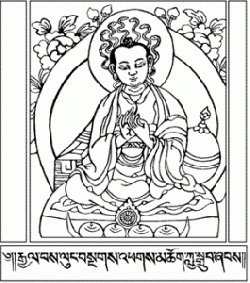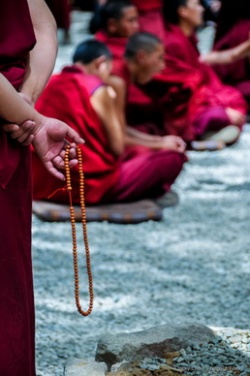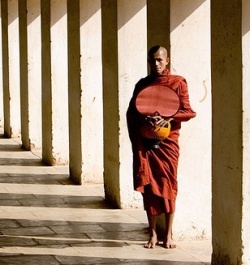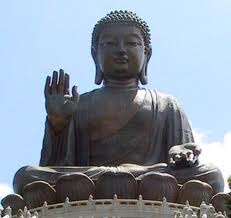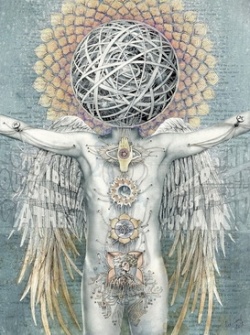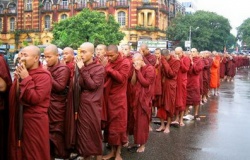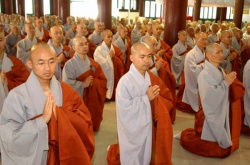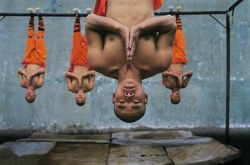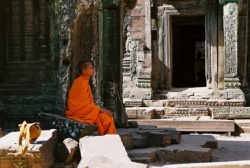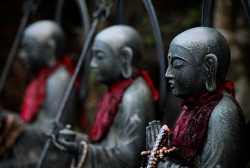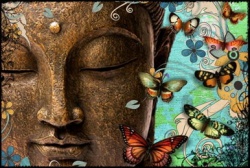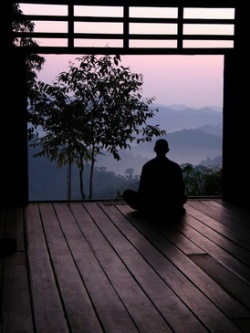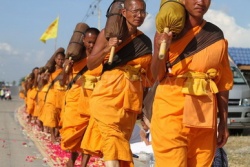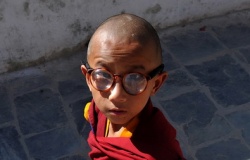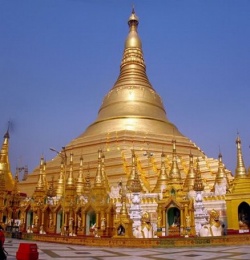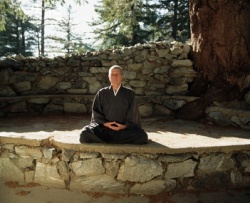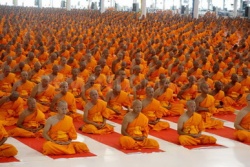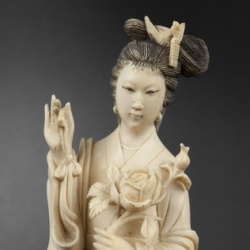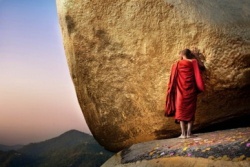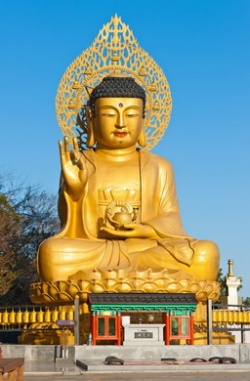Nâgârjuna's "Friendly Epistle Translated By Heinrich Wenzel, Ph.D.
- In Sanscrit: Suhridlekha (sic); in Tibetan: Bçes-pai-phrin-yig ("Friendly epistle")
- Praise to Manjuçrî kumârabhûta!
- 1. O thou of virtuous character, worthy of happiness, hear these noble verses which I have composed shortly, that (I thereby) might gather the merits, proceeding from the proclamation of the Sugata's words.
- Comm. "Shortly," he says, in order that you may not be afraid of his making many words.
- 2. As an image of the Sugata, even if only made of wood, is honoured by the wise, as is right, do thou also not despise my speech, even if humble, considering that it is the exposition of the Good Law (saddharma).
- 3. Though thou didst hear in thy mind (before this) a little of the instruction in the great Muni's law, is (appears) not also a whitewashed wall whiter still in the light of the moon?
- 4. Remember the six Memorable Things that have been ordained by the Jina, viz., the Buddha, the Law, the Community, Charity, Morality and the Gods, according to to the measure of their virtues.
- (The six Anusm.rtaya's s. Dharmas. 54.)
- Comm. "According to the measure of their virtues," Buddha, for instance, you must remember as Bhagavat, Tathâgata, Arhat, the truly accomplished Buddha, the Possessor of wisdom and the principles, Sugata, the Knower of the worlds, the steersman for the conversion of man, the Highest one, the Teacher of gods and men (cf. Divyâvadâna, ch xv. beg., etc.) "The victorious conqueror" p. 7 (Bcom-ldan-hdas = Bhagavat) he is called, because he has conquered lust (râga) and the other (evil passions); because he has penetrated to the heart of wisdom (bodhisâra); because he conquered Mâra who put hindrances in his way; because he obtained every fortune (bhaga), as riches and so forth.
Tathâgata (De-bzhin-gçegs-pa) he is called, because he understands the things as they are (gam in the sense of: to perceive, understand, as in gati, etc.; likewise Maheçvara comm. on Amarakosha: satya.m gatam jñâta.m yasya); and because his words will remain so, as he did pronounce them, without being changed (cf. âgama the sacred tradition).
"The Conqueror of foes" (dgra-bcom-pa = Arhat) he is called because he conquers (hanti) the (common) foe (ari), viz., the misery of sin; because he has conquered (i.e. destroyed) the spokes of the transmigration-wheel; also because he deserves (arhati) to be honoured by property (i.e. sacrifices) and respect.[1] . . .
"Knower of the worlds:" "World" it is called, because it is (from time to time) destroyed (Hjig-rten, "Receptacle of the perishable" or "R. of destruction" = loka from luñc; like the grammatical term luk?).
This world is of two kinds: the world of the living, and the world of the lifeless (Dharmas. 89).
The world of the living he knows according to the conditions of the twelvefold chain of causation (v. 109 ff.); of the world of the lifeless: Earth, mountains, etc., he knows origin, conditions, place, etc. . . . "Teacher of gods and men" (is said), because these two are the highest (degrees of animate beings) or because they are vessels of the Noble Path (v. 113). . . .
Buddha (Sa"ns-rgyas, "Wide awake") he is called, because he has a wide (comprehensive) mind, and therefore is like an opened (rgyas) lotus, and because he, waked from the sleep of ignorance, is like a man waked from sleep. . . . Similarly the remaining five articles are expounded by the comm., who then goes on: Because these six Memorable Things clear up the mind, and become the ground of great merit,
- [1. Both these explanations of Arahat, the latter fanciful besides the right one, we also find in Eitel, Handbook, p. 12 f.]
- 5. Steadily observing the tenfold way of virtuous action in body, speech, and thoughts (and also) turning away from spirituous liquors, you will feel a sincere joy in this (your) virtuous life.
- Comm. gives the ten virtuous actions in this manner: You must give up killing, stealing, impurity, lying, slander, harsh language, frivolous talk, covetousness, malice, and must adhere to the right doctrine (cf. Dharmas. 56;
also "Der Weise und der Thor," p. 13, 9 ff., transl. p. 15 f.). Of these, three concern the body; four, speech; and three, the thoughts. Cf. M. Müller's Note to his translation of the Dhammapada (Sacred Books X.) v. 96; also in Böhtlingk's Ind. Spr., the verse beginning kâyena kurute and 1559 f.; Udânav. vii. 1 ff.) "Though the drinking of intoxicating liquors (cha"n) is a grave fault, it is not (to be reckoned) as a sin, and therefore is treated separately.
There are three kinds ofcha"n: from sugar-cane, from rice-meal, and from honey" (cf. v. 33).
- 6. Knowing that riches are unstable and void (prop. "heartless"--asâra), give (of them) according to the moral precepts, to Bhikshu's, Brahmins, the poor and (your) friends, for there is no better friend than giving (liberality).
- Comm. "heartless," because it is insatiable.
- 7. Exhibit morality (çila) faultless and sublime, unmixed and spotless, for morality is the supporting ground of all eminence, as the earth is of the moving and immovable.
- 8. Exercise the imponderable Transcendental virtues of charity, morality, patience, energy, meditation, and likewise wisdom, in order that, having reached the farther shore of the sea of existence, you may become a Jina-prince. (The six Pâramitâs s. Dharmas. 17.)
- 9. Those families where father and mother are honoured are blessed by (lit. endowed with) Brahma and the teachers; they (i.e. the children in their turn) will be honoured and finally reach heaven.
- p. 9
- Prof. Windisch draws my attention to a similar passage, Itivuttaka.m Sutt. 106.
- 10. Renouncing murder (hthse, s. preface), theft, lewdness, lying, wine, eating at improper times, pleasure in high seats, singing, dancing, and (certain) kinds of wreaths.
- 11. If any one, man or woman, possesses these eight parts of an Arhat's morality, and wishes it in confession, he (or she) is born again among the Kâmâvacaradeva's
- On the eight Çîla's s. Childers s.v. and Uposatha. The Kâmâvacaras s. Dharmas. 127.
- Comm. Incense and wreaths are prohibited, if they only serve for pleasure (cha-vai-don-du), but not if they are used in the interests of the law (religious service), or for medicinal purposes.
- 12. View as enemies: avarice (mâtsaryam), deceit (çâ.thyam), duplicity (mâyâ), lust (?), indolence (kausîdyam), pride (mâna), greed (râga), hatred (dvesha), and pride (mada) concerning family, figure (i.e. beauty), glory, youth, or power.
- These different faults and sins s. Dharmas. 67, 69, 139, also 30, and Dhammasa"ngani 1113-34, 1229.
- 13. The Muni has taught that carefulness is the abode of immortality (am.rta--i.e., according to Comm., Nirvâ.na); carelessness (pramâda) the abode of death; therefore be always reverentially careful, in order to increase (thy understanding of) the law of virtue.
- 14. Who, having formerly been careless, afterwards becomes careful, is beautiful like the moon freed from clouds, as (were) Nanda, Angulimâla, Kshemadarçin, Udayana.
- On Nanda (Dga-vo), s. Kern, "Buddhismus," I. 133; 153 ff.; A"ngulimâla (Sor-phre"n can), ibid. 219; also "Der Weise und der Thor," ch. 36; Ajâtaçatru (i.e., Kshema-darçin = Mthon-ldan, supply dge-va, s. Schiefner, Târ. transl. p. 2, note 1 and Wassiljew's transl. preface, p. iv.), s. ibid. p. 226 ff. Udayana (Bde-byed; Comm.: Bde-ldan) was according to Comm., "nobleman (kulaputra), who, after p. 10 having committed adultery and murdered his mother, was converted by the Tathâgata and released from hell.
On his name, s. preface and cf. also Lebensb. p. 269. (Cf. Dhmpd. 172 = Udânav. xvi. 5.)
- 15. Since nothing is so difficult of attainment as patience, open no door for anger, the Buddha has pronounced that he who renounces anger shall attain the degree of an Anâgâmin.
- Comm. says that it is more difficult to find a patient man, than (a hermit) who feeds on wind, water, roots, and (raw) fruits, and dresses himself in hairs, leaves, bark, and rags, but that by bodily penance alone (lus-gdu"ns-pa tsam-gyis) not even a happy rebirth (i.e., as man or god, s. Dharmas. 57) is to be obtained, much less (final) salvation. Anger (krodha) is the becoming wild and displeased if anything disagreeable is done to us by men or other beings (amanushya); patience (kshânti) is freedom from anger, and if anger should rise (in us), quieting it at once. (Cf. Böhtlingk, Sprüche, 5045.)
- 16. "This one scolded me," "this one blamed me," (or) "beat me," if so (saying) you bear hatred (to any one), quarrel arises, but when (you) renounce hatred (you) will sleep quietly. (Cf. Udânav. xiv. 9 f. = Dhammap. 3 f.
- 17. Know that the thoughts are painted, as it were, on earth, water, and stone; among these may (for thee) the sinful ones always be like the first (i.e., perishable), the virtuous ones like the last (i.e., constant).
- Second part of verse not quite sure.
- 18. The Jina has declared that men have three kinds of speech: the agreeable, the true, and the untrue one, which are (respectively) like ambrosia, like a flower, like an unclean (thing); of these avoid the last. (Cf. Böhtlingk, Spr. 9732. Udânav. viii. 14; Subhântasutta 4.)
- 19. There are four kinds of persons (pudgala): those that go from light to light, those that go from darkness to darkness, those that go from light to darkness, and those that go from darkness to light; of these do thou the first!
- By light is meant a happy rebirth (as god or man of high position); by darkness--an unhappy one (as an inhabitant of hell, animal, Preta, or man of low position): thus comm. (Cf. Mahâvastu, 27, 28, and v. 15 of this letter.)
- 20. Understand that men are like Âmra-fruits, some that are unripe look as if they were ripe, some ripe ones look unripe, some unripe ones look (also) unripe, and some ripe ones look (also) ripe.
- 21. Do not look after another's wife; but if you see her, regard her, according to (her) age, like (your) mother, daughter, or sister; if you love (her?) then think purely even on the unclean (things).
- Comm. points to v. 25. (Cf. Divyâvadâna, 115, 5 f.)
- 22. Guard the fickle mind like (your) fame, like a son, like a treasure, like (your) life; and be afflicted or sensual pleasure like (or: as) on a poisonous (gdug-pa, sc. snake), poison (dug), a knife, and fire.
- Comm. The objects of the senses are hurtful (malicious) like a snake, because they do us and others harm; they kill like poison, because they destroy the virtuous works; they hurt like a sword, because they lead to the bad rebirths (cf. v. 19); they burn like fire, because they produce remorse.
- 23. Because the desires beget destruction, the prince of the Jina's has likened them to the Kimpa-fruit; renounce them, for by their iron fetters the world is bound in the jail of the orb (of transmigration).
- Comm. The Kimpa-fruit has a good (sweet?) shell, but the kernel is bad. (Kimpâka, probably, was in the Sanscrit text; cf. Böhtl., Spr. 5255, and Pet. Wört. s.v.)
- 24. Of him who has conquered the unstable, ever moving objects of the six senses, and him who has overcome the mass of his enemies in battle, the wise praise the first as the greater hero.
- Comm. says that even animals may conquer their enemies, but not their senses. (Cf. Dhmp. 103 = Udânav. xxiii. 3.) The six objects s. Dharmas. 33.
- p. 12
- 25. The body of a young woman (viewed) from the one (right) point of view, is of evil flavour, (having) nine deep openings, like a vessel of everything unclean, difficult to fill, only covered with skin;[1] even (her) ornaments view from (this) one side.
- 26. As a leprous (man), infested by worms, even if he, to mitigate (his pain), keeps near the fire, will not find any rest, so know it to be also with those who are affected by desires. (Cf. v. 22. Böhtl., Spr. 3272.)
- 27. In order to attain the highest aim (paramârtha), take these things to heart and meditate thereon; there is no other law (dharma) having virtues like this.
- 28. Although a man possess rank ("family"), beauty ("figure"), and erudition (thos-pa, i.e., çrutam), but be devoid of wisdom (prajñâ) and good behaviour (vinaya), he will not be honoured; but who possess these two virtues, even if he be devoid of other virtues, will be esteemed.
- 29. Thou, who knowest the world, be equanimous against the eight worldly conditions: gain and loss, happiness and suffering, fame and dishonour, blame and praise, for they are not (fit) objects for your thoughts. (S. Dharmas. 61.)
- 30. Do not commit sin for (in the interest of) a Brahmin, a Bhikshu, a god, (thy) parents, (thy) wife, or subjects, for no one will take part in the requital (vipâka) for your sins (in) hell. (Cf. Dhmpd. 105 = Udânav. xxviii. 11.)
- 31. Though some who have committed sinful actions are not cut as with a knife (i.e. instantly punished), in the hour of their death, the fruits of what sinful actions there are (i.e. they have committed) will appear.
- Comm. Therefore some people die with a clear countenance (bzhin-mda"ns), but others with a bad (disfigured) one. (Cf. Udânav. ix. 17.)
- 32. Faith (çraddhâ), morality (çîla), liberality (dâna), religious lmowledge (thos = çruti), shame (hrî), carefulness (apatrapâ), and wisdom (prajñâ), the Muni has pronounced to be the seven possessions; other possessions regard as common and useless.
- [1. Böhtlingk points out to me the likeness in Spr. 807.]
- p. 13
- Comm. Morality is eightfold: the duties (sdom-pa) of a Bhikshu and a Bhikshu.nî, a Dge-slob, a Çranma.na (dge-sbyo.n) and a Çrama.nâ, a Çrama.nera and a woman of that degree, and an Upâsaka (bsñen-gnas). "Shame" is the aversion to faults regarding one's-self, "carefulness" the same regarding others. (Cf. v. 12. Udânav. x. 1 ff.)
- 33. Betting, looking out for crowds (as for some festival, etc.), indolence (kausîdyam), the company of bad men, (drinking) wine, and strolling about at night, these sins, equally known as the prevarications ("nan-so"n = durgati?), avoid.
- Comm. . . . "Wine" (cha"n) either is fabricated (bcos-pa) or only gathered (sbyar-va) i.e. pressed out of flowers (cf. madhu in the Pet. Wört., chiefly R. 5,60,9, quoted there, to which Böhtlingk calls my attention), etc. (Cf. v. 5.)
- 34. The teacher of gods and men has pronounced that of all possessions contentedness is the best by far; therefore be always content, for if (you) are content, you will be rich, even if not possessing any (external: Comm.) goods.
- Comm. remarks, that contentedness is the fruit (i.e. end and aim) of all possession; if a poor man, therefore, be content, he has already obtained the purpose of wealth. A man is (to be called) "content," if he does not pine for the past, does not long for the future, and is not too much addicted to the present (fortunes). (Cf. Böhtl., Spr., anto nâsti and ko vâ daridro.)
- 35. O noble one! men who have few wishes have no pains (cares) like the rich; from each head of the many-headed Nâga princes arise separate cares.
- 36. A woman that associating with (your) natural enemy, is like (i.e. to be likened to) an avenging goddess; one that, despising the lord of the house, is like Târâ; and one that, stealing though a little, is like a thief, these thou do not take as wives.
- 37. But one that is gentle as a sister, winning as a friend, careful of your well-being as a mother, obedient as a servant, her (you must) honour as the guardian god(dees) of the family.
- p. 14
- Comm. "As the god of the family," because she shields the family from damage. (Cf. Manu ix. 26; A"nguttara Nik., Sattakanipâta, quoted by Oldenberg, p. 191 note.)
- 38. As you know that food is (to be regarded) as medicine, do not use it, from lust or hatred, to become stout (and strong), proud or handsome, but only to keep your body (together).
- 39. Having repeated the essence of the rule during the whole day and the first and last watch of the night, sleep in the interval between them, (but) with consciousness, that even the time of sleep may not be without fruit. (Cf. Dhmpd. 157 = Udânav. v. 16.)
- 40. Always perfectly meditate on (turn your thoughts to) kindness, pity, joy, and indifference; then, if you do not obtain a higher (degree), you (certainly) will obtain the happiness of Brahman's world.
- The four Brahmavihâra's 5. Dharmas. 16; cf. Dhammasa"ngani, 262; Brahman's world, Dharm. 128.
- Comm: Maitrî (byams-pa) means the giving of happiness to the animate beings; Karu.nâ (sñi"n-rje), the shielding them from pain; muditâ (dga-va), not robbing them of happiness; upekshâ (bta"n-sñoms), equanimity and impartiality.
- 41. By the four Dhyâna's of (i.e. that consist in) completely abandoning desire (kâma), reflection (vicâra), joy (prîti), and happiness and pain (sukha, du.hkha) you will obtain as fruit the lot of a Brahman, an Abhâsvara, a Çubhak.rtsna, or (one of the) great kings.
- S. the four Dhyâna's Dharm. 72, chiefly Childers 169, Dhammasa"ngani, 83-88; the mentioned classes of gods, 128.
- 42. Fivefold are the actions, virtuous and sinful, that arise from perseverance, longing, absence of an adversary, and from the ground of the highest excellence, of these (or: therefore?) strife for virtue.
- 43. As by an ounce of salt a little water is spoiled, but the river Gangâ is not (spoiled), though it rolls corpses, thus know that it is the same with a little sin on an extensive root of virtue.
- Comm. Thererore be not too much afraid if, upon great virtuous actions, you have committed a little sin. (cf. Dhmpd. 173. Udânav. xvi. 96.)
- 44. Understand that the five depravities of (groundless) joy and sorrow, malevolence, sloth (styânam) and sleep (at the wrong time), desire and doubt (vicikîtsâ) are the thieves that steal the treasure of virtue. (Five other "depravities," s. Dharm. xci.)
- 45. Faith, energy, recollection, meditation, and wisdom are the five best things (dharma); strife after these, for they are truly the highest "forces" and "qualities." (S. Dharm. 47, 48; Dhammasangani, 74 ff. 95 ff.)
- 46. Thinking again and again: as I cannot avoid the pain of illness, age, and death, so I also will not go beyond (i.e., lose the fruits of) the works done by myself, be not proud of this help.
- 47. But if you indeed long for heaven and liberation, then entertain the true faith (samyagd.rshti); all men who have a wrong faith (mithyâd.rshti), even if their conduct is good, will (only) find a bad requital (vipâka).
- 48. Know that a man who takes no joy in perfection (samyaktva) is unstable (anitya), soulless (anâtman), and unclean; and that, through want of attention (sm.rtyupasthâna), (he falls into) the misery of the four wrong views.
- Comm.: Mi-rtag-pa (anitya), who only lasts for a moment; bdag-med-pa (anâtman), who is bare of the interior purusha (na"n-gi byed-pai skyes-bu). . . . The "four wrong views," if one thinks (1) that pain (duhkha) is joy (sukha); (2) that the unstable is stable; (3) that the unreal is real; (4) that the unclean is clean. (Cf. Dharm. 55 and 97, and chiefly Kern, I. 474.)
- 49. If you say: I am not the form, you thereby will understand: I am not endowed with form, I do not dwell in form, the form does not dwell in me; and, in like manner, you will understand the voidness of the other four aggregates. (The Aggregates, s. Dharmas. 22; Dhammasangani, 1083, cf. 59 ff.)
- 50. The aggregates do not arise from desire (? hdod-rgyal), p. 16 not from time, not from nature (prak.rti), not from themselves (svabhâvât), nor from the Lord (îçvara), nor yet are they without cause; know that they arise from ignorance (avidyâ) and desire (t.rsh.nâ).
- Comm. Explains hdod-rgyal by gnam-babs (?). "Time" the followers of (the doctrine of) Time (dus su smra-va-rnams, cf. kâlakâra.nika in Aufr. Cat. Oxon. 216 b. 7 f.) declare to be the cause of all growth and decay with the following words: "Time ripens what has come to existence, Time destroys the creatures, Time wakes the sleeping (sic!), to escape Time is difficult" (it is the verse, Böhtl., Spr. 1688). "Nature," the Sâ"nkhya's (gra"ns-can-rnams) declare to be the original cause of all things, consisting of Sattva (sñi"n-stobs), Rajas (rdul), and Tamas (mun. cf. Sarvadarçana-sa.mgraha, transl. p. 227, Manu. xii. 24 ff). The "Lord" is the fine and inconceivably soft, all-knowing, and all-doing object of meditation (dhyâna), for the wise meditators practised in Yoga, whose (the Lord's) body consists of sun, moon, water, fire, wind, the regions (of the sky), and ether, on whom those who long for the joy of (inner) quietude constantly meditate.[1] Then follows a lengthy explanation why the Aggregates do not arise from these different causes. But, "like seed, covered with dung and watered, buds up, so, covered with ignorance and watered by desire, existence (bhava) arises." (Cf. v. 110 f.)
- 51. Know that attachment to religious ceremonies (çîlavrataparâmarça), wrong views (mithyad.rsh.ti), and doubt, (vicikitsâ) are the three fetters (sa.myojana, s. Childers s.v. Oldenberg, Buddha, 435, 451 f., Eng. transl. p. 430, 448) obstructing the entrance to the city of salvation. (Cf. Dharm. 68; Dhammasa"nga.ni, 1002.)
- This verse seems spurious, as the commentary is wanting.
- 52. As (your) salvation only regards (and depends on) (your)self, there is no use in taking any one else as companion, but, observing the holy doctrine (çrutam), morality
- [1. Cf. Vedântasâtra 43 (Böhtl., "Chrestomathie," p. 259; Jacob, "Manual of Hindu Pantheism," p. 48).]
- p. 17 (çîla), and contemplation (dhyâna), apply yourself to the fourfold truth. (Cf. v. 30.)
- 53. Steadily instruct yourself (more and more) in the highest morality, the highest wisdom, and the highest thought, for the hundred and fifty-one rules (of the Prâtimoksha, Comm.) are combined perfectly in these three. (The three Çikshâ's s. Dharm. 140. cf. Udânav. vi. ll.)
- 54. O Lord, the Sugata has taught that the remembrance concerning (the care to be taken of) the body is the only way that must be trod; therefore keep to it with firm endeavour, for when remembrance (carefulness) is wanting, all things (dharma) must decay.
- Comm. quotes the following words of Buddha: Bhikshus, for the living beings there is, in order to do right, to overcome pain and inconvenience, to understand the true law, and to obtain Nirvâna (only) one way that must be trod, viz., Remembrance concerning the body. (Apparently the kâyânudarçam.rtyupasthânam, Dharm. 44, is meant, which there has not been accurately translated.) All these things (dharma, i.e., fruits, as enumerated) decay (come to naught), etc. Cf. Oldenberg, p. 311 (transl. 305) ff.
- 55. Life, though being more unstable than a bubble driven by the wind, has as many troubles as one exhales and inhales, or awakes from sleep, and this is astonishing much.
- 56. Know that the body, which at the end (of life) either is consumed, or dries up, or putrefies, or (finally) becomes unclean and substanceless, and (thus) is completely destroyed and dissolved, is by its nature unstable.
- Comm. The body is "consumed" if it is burned; it "dries up" if buried in the ground, by the action of wind and sun (!); it "putrefies" if, thrown into water, it is carried on by this; it becomes "unclean" if animals devour it. (A sentence of the Bhagavat himself is quoted, where he details these different modes of disposing of the dead.)
- 57. Since even the earth, the Meru, and the ocean, having burned for seven days, will become bodies of flame p. 18 and be consumed, without leaving an atom, how should it be otherwise with man, (who is so) very weak?
- 58. Because thus (as demonstrated) all this is unstable (anitya), without substance (anâtma), without help (açarana or ni.hç.), without protector (anâtha), and without abode (asthâna), thou, O Lord of men, must become discontented with this worthless (asâra) Kadalî-tree of the orb (of transmigration). (About Kadalî s. Pet. Wört.)
- 59. As it is more difficult to rise from (the existence as) animal to the dignity of man, than it is for the tortoise to find the hole of the yoke that is in one (and the same) sea, exercise the good law (saddharma) with your power as man, and make appear its fruits.
- Comm. In a certain sea of the world a blind tortoise dwells which rises to the surface (every) hundred years. In the same sea there is a yoke (gña-çi"n) with a hole (bu-ga) in it, that by the easterly wind is driven west. This is the time when the tortoise's neck may enter the hole of the yoke.
- 60. He who, born as a man, commits sin, is more foolish than he who fills vomit in golden vessels, adorned with jewels.
- Comm. Because the human dignity is more difficult of attainment than a golden vessel.
- 61. The life in a land of (common) agreement, the support of a holy man, my good counsel, and good works formerly done (i.e. their fruits), those four great wheels are in thy possession.
- Comm. "Land of agreement," where every one's mind is like the other's and agrees (with it). "A holy man" is a Virtuous friend (kalyâ.namitra) (Cf. Childers s.v.; Dhammasa"ngani, 1328.) "Wheels," that move the carriage of the sublime path. Since then you are possessed of the four, endeavour to generate in you the subl. path.
- 62. Because the Muni has explained that he who leans on a Virtuous friend, will be able to lead to the end a pious life, therefore lean on a holy man, for, leaning on the Jina, you certainly will find complete rest.
- p. 19
- Comm. quotes a speech of the Buddha to Ânanda, wherein he says that the support of a Virtuous friend is the half of a holy life--brahman (thsa"ns-pa) is explained here by Nirvâ.na, and brahmacarya (thsa"ns-par spyod-pa) as the way thereto.
- 63. (Adopting) wrong views, being born among the brutes, among the Pretas, or in hell, (at the time when) the law of the Jina is not (observed), in a foreign country among barbarians, being dumb and stupid (dumb and deaf?),
- 64. Or being born anywhere among the Longlived gods, these are the eight unfavourable moments; if you, freed from these, get a (favourable) moment, then exert yourself to avert (any future unfavourable) birth.
- The Aksha.na's s. Dharm. 134, where Trigl. 66 (34) is forgotten. The "birth as Preta" is the same as Yamalokopapatti; for "if the law of the Jina is not," the Dharm. has cittatpâdavirâgitatâ; "dumb and stupid" (glen-zhi"n lkugs-pa, explained by Comm. as: one who makes signs with the hand) = Indriyavikalatâ. The "Longlived gods are the Asa.mjña's and the Arûpa's" (Dharm. 128 f.). "These eight are called Aksha.na, because therein you will not find rest. (Ksha.na) for the performance of virtue."
- 65. O Noble one, grieved at this orb (of transmigration) which is the ground (origin) of the stings of passion, of death, illness, age, and many other pains, only hear a part of those evils.
- Comm. The evils of the orb are sevenfold: Uncertainty (v. 66), Insatiability (67), Waste of bodies (68), Continuous Conception (68), Continual Change between high and low position (69 ff.), Want of a companion (75), and the six states of birth (77 ff.).
- 66. Since there is a (constant) change between (the conditions of) father and son, mother and wife, friend and foe, (it is clear that) within the orb there is no certainty whatever.
- 67. If every one has drunk more milk than (water is contained in) the four seas, even then the common people p. 20 (p.rthagjana) who are caught in the orb, will demand to drink more.
- 68. The heap of any one's bones (from his successive births) exceeds in quantity mount Meru; and if a man were to count his (successive) mothers by grains (of soil) not larger than juniper-berries, the earth would not suffice (to form them).
- 69. Even he who has been honoured in the world of Indra falls, through the force of his works (karma), again to the earth; even after having risen to world-sovereignty (cakravartitvam), he, in the course of transmigration, will become a slave.
- To the first part of this verse cf. "Der Weise, &c.," ch. 45, chiefly 300, 3 = transl. p. 375, and Divyâvadâna ch. 17.
- 70. After having enjoyed for a long time the happiness of touching the breasts and waists of the heaven-maids (i.e., Apsaras, cf. svargastrî), one must endure in hell the intolerable pains of grinding, cutting, and lacerating.
- Comm. The pain of grinding is to be endured in the hell Sa.mghâta, cutting in Kâlasûtra, and lacerating in Tâpana and Pratâpana. (S. v. 77, 78.)
- 71. After having dwelt for a long time on the summit of Meru, enjoying the pleasure of a ground that sinks and rises to the touch of the foot (i.e., is elastic), afterwards the intolerable pain of walking on (in) hot ashes and mud is entailed on you.
- Comm. "A long time," thousand years of the gods. The "hot ashes" reach to the knees, and when you set down your foot skin, flesh, and blood are destroyed, and, on raising it, grow again. The "mud" is a morass of excrements, where beasts called: "Worm with the pointed bill" live, whose body is all white, the head black. These (beasts) pierce the skin of those animate beings (who are driven there by their fortune).
- 72. After walking and playing, in company of the p. 21 heaven-maids, in a pleasant and delightful grove, again you must undergo, in a wood where the leaves are like swords, the cutting of feet, hands, ears, and nose. (Cf. Manu, xii. 75.)
- 73. After having entered (i.e., bathed in) Mandâkinî (hdal-gyis hbab-pa, "softly flowing," s. Amarakoça, Tib. transl.) which is gay with beautiful Apsarasas and (round which grow) golden lotuses you must again enter the intolerably salt water of the hell-river Vaitara.ni (rab-med, "fordless," Amarak.).
- 74. After having obtained the very great happiness of desire (i.e., of the senses) in the world of gods (viz., the Kâmâvacara's), and the unsensuous happiness of Brahmahood, you must, becoming fuel in the fire of (the hell) Avîci, suffer uninterrupted pains.
- 75. After having become like sun and moon, and having illuminated with the light of your body the ends of the world, again you will come into the utter darkness, where you will not even see your arm, if you stretch it out.
- Comm. The "utter darkness" is in the intermediate space of the worlds (Lokântarika). (Cf. the Comm. on v. 50 about Îçvara.)
- 76. Since then you must die in this manner (in uncertainty as to your fate), take the lamp of the three merits to give you light, for alone you must enter this endless darkness, which is untouched by sun and moon.
- Comm. The three kinds of merits (meritorious actions) are: those of body, speech, and thought (v. 5), or else: those arising from liberality, morality, and meditation (i.e., the three Çikshâ's, v. 53).
- 77. Those living beings that have committed sinful actions, will have to endure continuous pain in the hells Sa.mjîva, Kâlasûtra, Mahâtâpana, Sa.mghâta Raurava, Avîci, and so forth.
- Comm. By "and so forth," he understands the remaining (of the eight hot hells), the cold hells, and the Ñi-tse (s. Jäschke, who has ñi-thse). . . .
In (the hell) Sa.mjîva the living beings, being seized by different cutting instruments that have sprung from their (evil) works, all their principal p. 22 and minor (pratya"nga) members are cut off, and, becoming insensible, they roll on the ground. Then there issues a voice from the sky: Become ye sound again (khyed-rnams ya"n sos-par gyur-cig), therefore this hell is called Ya"n-sos.
In Kâlasûtra the living beings are put, by the tormentors (skyes-bu gnod-pa bye-pad), that are there, between mountains of different form, and, a black string (thig-nag) having been drawn, they are cut and split like wood, therefore this hell is called Thig-nag. In Sa.mghâta the l.b.,[1] having been assembled (bsdus) together, are pushed by the tormentors that are there, between mountains of different shape, and when these mountains are pressed together then the blood of those pressed flows like a river.
Likewise they are put in a large iron press (btsir-spyad), where from above a large stone descends, pressing the iron ground (sa-gzhi), tormenting, oppressing, destroying (hjolns-par byed), everywhere, therefore this hell is called Bsdus-hjoms (or º gzhom).
In Raurava, the l.b., seeking a dwelling (i.e., some kind of refuge), are put into an iron house.
From those that have entered there a fire springs up, and, becoming one (immense) flame, burns them (so vehemently) that they cry (hbod) in roaring lamentation; therefore this hell is called "Nu-hbod ("Wailing Cry").
In Mahâurava, which surpasses the last in cruelty, the l.b., seeking for a dwelling, are put into a house (not larger than a) box (and treated as before); therefore this hell is called "Nu-hbod chen-po ("The Great Wailing Cry"). In Tâpana, the l.b. are put--into (iron) pans, heated to a high degree, and roasted.
Pierced by the fire as by spears, they give forth ashes, and from all their pores and apertures fire issues. Again they are laid down on the heated ground, and struck with very hot iron hammers. Therefore this hell is called "Thsa-va" ("The hot one"). In Pratâpana there is this difference, that they are stung by those (flames like) spear-points, of which two make ashes come forth from the back and front, one from the head. Also their bodies are bound with red-hot iron
- [1. Living beings.]
- p. 23 bands. Again they are thrown, head foremost, into boiling salt-water contained in heated iron cauldrons, and wherever they go (i.e., swim), their skin, flesh, and blood are destroyed, and nothing is left but a bony skeleton. When they emerge, their skin, flesh, and blood grow again.
Therefore this hell is called Rab-tu-thsa-va ("The very hot one"). In Avîci, the fire burns from the four sides, from above and below, and meeting (in the middle) attacks skin, flesh, fibres, and the inmost marrow of the bones of the l.b., and dwells there, as if the essence (sâra) of fire had become attached to the body.
Only by the doleful wailing cries you can tell which is the living being, which the fire, for (altogether) it looks like one mass of fire.
And because there is for the l.b. no interval (bar-mthsams; to vîci also is given the meaning of avakâça, thus Childers: leisure) of fire and pain, therefore this hell is called Mthsams-med ("Continuous"); the same explanation in Chinese v. Eitel.--
The usual Tibetan translation of Avîci; as also in our verse, is Mnar-med ("Painless"), and this would seem to be an euphemism opposed to the explanation found in Maheçvara's comm. on Amarak. (na vidyate vîcih sukha.m yatra). (Cf. Dharm. 121.)
- 78. Some are pressed like sesamum (seeds), others are ground to dust (so minute) like fine flour, some are split by saws, and others are cut by ugly knives with sharp edges.
- Comm. In Sa.mghâta they are pressed in the hot iron press (s. above), and also pounded, by the keepers of this hell, in iron sieves as mortars, with their sharp bills (snouts) as pestles. In Kâlasûtra they are split by the Lords of the Dead (Yama's), who, unconcerned about any man, i.e., his woes, briskly begin their work (mi-ci-la ma rag-par chas-pa brod-brod-ltar hdug-pa), as wet wood is split by carpenters, with heated strong-toothed saws, and axes heated in the fire.
- 79. In like manner others are made to drink the hot fluid of melted bronze, and some are fixed on iron stakes, red-hot and pointed.
- Comm. On the bank of the river Vaitara.nî (s.v. 73) they p. 24 have opened their mouth with hot pincers, and made to drink metal that, by a violent fire, has lost its consistency, and may be drawn out (sra-va-las thal-te nal-nal-po ñid-du gyur-pa). The stakes are to be found in Tâpana.
- 80. Some, lacerated by furious dogs with iron fangs, raise their hands to the sky (wailing, Comm.); others are seized by hawks with sharp iron bills, and ugly claws.
- Comm. The dogs are in the wood with sword-leaves (v. 72), the hawks in the Çalmali-wood (cf. Pet. Wört. s.v.).
- 81. Some bitten by different kinds of worms and beetles, and ten thousand flesh-flies and blackflies, whose touch produces great ugly wounds, roll (unconscious on the ground), and utter loud lamentation.
- Comm. The "worms" grow out of the body, the "beetles" come from without; they are difIerent in colour and form; by the "black flies" is meant the black fly-abscess (? sbra"n-ma lhi"n-nag).
- 82. Some are burned without interruption in heaps of glowing embers, and even their mouths are filled (therewith); some are cooked in great cauldrons made of (!) iron, like the gourd (? cu"n-pe"n) of the fruit Spiu-thsugs (?).
- Comm. says that the former takes place in Tâpana, the latter in Mahâtâpana. (Cf. Manu, xii. 76.)
- 83. The sinner who, hearing of the endless pain of hell that is not interrupted for so long as one can retain his breath, becomes not afraid (and repents, Comm.), he has the character of a diamond (i.e., is truly impassible, since the pains of hell will begin immediately after his death, Comm.).
- 84. But those who, seeing a picture of hell, hearing (of hell), remembering (it), reading (about it), or making images (of it), generate fear (of it), they certainly will experience immense rewards (vipâka).
- (S. Divyâv, p. 300 ff. on a picture of the hells (and the rest of the world) and its purpose. Such a picture is to be found, for instance, in Georgi, Alphab. Tibet.)
- p. 25
- 85. As among all blisses the bliss of the cessation of desire (i.e., complete liberation, Comm.) is the highest, thus among all pains the pain of the hell Avîci is the most unsupportable.
- 86. The pain of him who, in this (world), is, during an (entire) day vehemently stung with three hundred spears, cannot be compared even to the smallest pain of hell.
- 87. This intolerable pain of hell does not end, even if you have endured it for a hundred ko.ti's of years; as long as the (fruits of) your sins are not exhausted, so long you will not get rid of your life (in hell).
- 88. Therefore exert yourself with energy that there may not by any means be as much as an atom of the seed of this sin-fruit, (produced) by evil action, speech, or thought.
- 89. Also in the condition of brute (you will suffer) killing, binding, striking, and various other pains; and (the brutes), having abandoned pacifying virtue (?), will eat up one another without pity.
- Comm. explains zhi(-var) hgyur(-va), what I translate "pacifying," by: "nes-par hbyed-pai cha-da"n mthun-pa, the same words that explain "contemplation" v. 52, and "highest wisdom" v. 53 (one of the three Çikshâs), and says that Nirvâ.na is attained thereby, and that by want of this virtue the brutes are so stupid (as to devour each other).
- 90. Some (brutes) are killed on account of (their) pearls, wool, bones, blood, flesh or hide; others forced into the service (of man) by kicks or blows of hand, whip or iron hook.
- Comm. For his "bones" (tusks) the elephant, for instance, is killed; for it's "flesh," game, etc.; for its hide, the leopard, etc. With "kicks" the horse is driven; with the "hand" the buffalo; with a "whip" the ass; with an "iron hook," the elephant.
- 91. Among the Preta's also you must endure the uninterrupted (because never quenched, Comm.) pain born from the stings of desire, and the quite intolerable (pain) arising from hunger and thirst, heat and frost, weariness and fear.
- p. 26
- Comm. Their "weariness" comes from their continually running after food (and never reaching it); "fear," from seeing the beings (tormenters armed) with swords, pestles, and leashes.
- 92. Some, having a mouth small as the eye of a needle, and a belly large as a mountain, are tortured by hunger, as they are not able to eat however little of the nasty excrements put before them. (Cf. Pañcagati, transl. Feer, Mus. Guim, v. 521.)
- 98. Some, having nothing left but skin and bones, are dried up like the naked top of a Tâla-tree; other, during the night, have a flaming mouth, and devour as food hot sand that falls into it.
- 94. But some common people, not finding matter (pus), excrements, blood, or other impurities strike each other in the face, when goitres will arise on their necks, on whose ripe matter they feed.
- 95. For the Preta's, in summer the moon herself is hot, in winter the sun himself is cold; the trees (in their region) are fruitless, and the rivers dry up, as soon as they look upon them.
- Comm. By their want of merit the boughs of the trees are burned as by fire, and lose fruits and leaves. The pleasant and cool rivers dry up (as if) burned by the poison of their eyes (mig gdug-pai dug-gis bsregs-pa). Some of them are filled (instead of food) with fire and live coal, some are thrust into rivers of matter, filled with different kinds of worms; some are filled with excrements and urine. (Cf. Feer, "Études Bouddhiques," 299.)
- 96. Without interruption this pain continues for those who have not abandoned sinful actions and have not reined in their body, some (of them) will not die (in this place of torment) in five thousand, some in ten thousand years.
- 97. The reason why beings must endure these different p. 27 torments as Pretas in one run (i.e., without interruption), the Buddha has declared to be their avarice and mean niggardliness. (s. Feer, ll. p. 303 f.)
- 98. In Heaven also, though the pleasure to be enjoyed is great, the pain of dying is greater: thus thinking, noble (souls) do not wish for the perishable (joys of) heaven. (Cf. v. 69 ff.)
- 99. The colour of the body becoming ugly, want of pleasure in (their) couches, decaying of flower-wreaths, appearance of dirt on (their) cloths, dust, that had not been before, arising from (their) body,
- 100. These are the five prognostics announcing death in heaven, that appear to the gods who dwell in the land of gods, similar to the signs that announce death to the men on earth. (Cf. Divyâv. ch. xiv. beg. Prof. Windisch points out to me the similar passage in Ittivuttakam, Sutt. 83.)
- 101. Those (now) who die off from the worlds of gods, if they have not any rest of (fruit of) virtue left, thence must irrevocably take their dwelling, according to their merit, among the Brutes, the Pretas, or in Hell.
- As god you cannot gain any merit (v. 64). But the Sarvâstivâdin's taught the reverse, s. Rockhill, "Life of the Buddha," p. 191, better than Was. 247; cf. Feer, ll. p. 276 ff.
- 102. Among the Asura's also, who, from their (spiteful) nature, hate (envy?) the splendour of the gods, there is much mental pain; and, though they have an intellect, from the inherent darkness of their state (gati) they are not able to see the truth.
- Comm. They have an intellect (sufficient) to know the difference between virtue and vice, but, unable to stick to virtue in this state, they fall back to vice. "Darkness:" because, in the state of Asura, you are obliged to think continuously on vice, but in the state as god, thoughts and (power of) execution incline to virtue, there is a great difference between the states of god and Asura or any other (lower). On the pains in the state of man he does p. 28 not enlarge here, because he alluded to this before in the words: O Noble one, etc. (v. 65), and because this (state) has been, before this, blamed (i.e., described as undesirable) by different men (s"nar ya"n mi rnam-pa du-mas smad-pai phyir).
- 103. Since the orb is thus (constituted), that the birth as god, man, infernal being, brute, or Preta is (likewise) bad, understand (then) than birth (itself) is a receptacle of much harm.
- 104. If a fire were to seize your head or your dress, you would extinguish and subdue it (by all means), even thus endeavour to annihilate desire, for there is no other higher necessity (duty) than this.
- 105. By morality, knowledge, and contemplation, attain the spotless dignity of the quieting and the subduing Nirvâ.na, not subject to age, death, or decay, devoid of earth, water, fire, wind, sun, and moon.
- Comm. Nirvâ.na is twofold: with, and without, a rest of the Skandha's; the first "quiets" all pain, the second "subdues" the senses. (Cf. Childers 267 b. Oldenberg, Buddha, p. 432 (transl. p. 427) ff.; the three ppÇikshâs[[, s.v. 53, also Udânav. vi. 11.)
- 106. Recollection, investigation, energy, joy, calm, contemplation, equanimity, these seven members of knowledge are the rallying-points of the virtues whereby one reaches Nirvâ.na. (The seven bodhya"nga's v. Dharm. 49; cf. Dhammasa"nga.ni 1355.)
- 107. Where there is no wisdom (prajñâ), there is also no contemplation (dhyâna); where there is no contemplation, there is also no wisdom; but know that for him who possesses these two, the sea of existence is like a grove (? gnag-rjes, perhaps nags).
- Comm. Remarks on gnag-rjes: "because it (the sea of ex.) is easily traversed by him," so we might correct, perhaps, gnag-rdsis, and translate: "the sea of ex. is for him as for a lord of cattle (shepherd; who has the means to ride)," sc. is a meadow. (Cf. Udânav. xxxii. 28.)
- 108. On the fourteen Undeclared worlds, which the p. 29 Friend of the sun has explained, you must not (even) think, for by this (i.e., in so doing) you cannot keep your mind quiet.
- Comm. Enumerates the fourteen Avyâk.rtavastûni (in the text was loka, s. Dharm. 137), and continues: These categories (vastu) are called undeclared, because they must not be declared, if anybody asks; they are questions to be put aside (sthâpanîya).
- 109. The Muni has declared that from Ignorance always springs the Conformations (in the text: las, "work"), thence Consciousness, thence Name and Form, thence the Six Organs of sense, thence Contact,
- 110. From Contact springs Sensation, from the ground of Sensation Thirst will arise, from Thirst the Clinging (to existence) will be born, thence Being, and from Being comes Birth,
- 111. And if Birth is (put) there arise Misery, Illness, Age, the pangs of desire, Death, Fear, and many other evils; but if Birth is stopped, all these are stopped (at the same time).
- Comm. First gives the list of the Nidâna's, as it is to be found in Dharm. 42, and also in Pâli s. Dhammasa"nga.ni 1336 (including the appendix çoka0). Then follows a lengthy exposition of the single items, and the series as a whole (two leaves), wherefrom only the most important part is given here. "Ignorance" is the not-knowing the truth, and not acknowledging the highest aim (paramârtha).
In an ignorant fool arise, in consequence of (his) not knowing virtue, vice; and in consequence of his not knowing the constant (ânejja, âneñja s. Childers), the Conformations. These are divided into (conform.) of body, speech, mind; here (in our verse) they are meant by Action (las = karman), because this also is divided in the same three parts (cf. Child. 454 b. Oldenberg 247 (transl. 241) ff.). By forming (lit. conforming) thoughts on the roots of these actions, Consciousness arises. This is sixfold (i.e., the conception of the six senses, v. 24; s. Was. p. 237 N). . . .
Name and Form is the condition of the (embryo) p. 30 conceived in the womb as Kalalam, etc. (s. Was. p. 236), which not yet has any sensation, etc., and (on the other side) the (child) come out, that has assumed a body (rgyur byas-pa). The embryo in its four states is "Name," because it leads to existence (bhava), and falls into the senses (? yul-la hgro-va): the emerged and embodied (human being) is "Form," because the (feeling) produced by cold, etc., arises (in it; ? gra"n-va la sogs-pa hgyur-va bskyed-pai phyir). (Cf. Child. 258 a; Oldenberg, p. 232 (transl. 227) ff.). . . . "Thirst" is the wish not to lose agreeable sensations, to get rid of unagreeable ones, and not to keep nor to lose those which are neither agreeable nor disagreeable (s. Dharm. 27); again it ("thirst") is, in the Sûtra, declared to be three-fold, according to its direction to the reign of pleasure, of form, or of the formless (s. Child. s.v. ta.nhâ). The "Clinging" is the violent desire (hdun-pai hdod-chags) of lust (kâma), etc. (s. Child. s.v. upâdâna.m and cf. v. 51; Oldenberg, p. 239 N. 1). . . . When the seed of Conformations is well watered with (the water of) Thirst and Clinging, the fruit of Being is produced (cf. v. 50). It is threefold like Thirst: (the Being) of pleasure, etc. (s. Child. s.v. bhava). But here chiefly the past existence is understood. When any one is born at the end of (this) existence, he is subject, one after the other, to (the states) "Name and Form" to "Sensation." . . . The whole series is divided into three parts: "Ignorance" and "Conformations" are (i.e., refer to) the past birth; "Consciousness" to "Being," the present; "Birth" and "Age and Death," the future (one). . . .
- 112. This concatenation of causes is made clear (to us) by the Jina's word, and deep (in meaning); who perfectly understands this, he perfectly understands the teaching of the Buddha.
- 113. Right views, living, energy, recollection, meditation, speech, action, thoughts these eight parts of the way practise in order to reach quiet. (S. Dharmas. 50. Dhammasa"nga.ni 297 ff. and 89 ff.).
- p. 31
- 114. Birth is Suffering, Thirst is the great cause from which all this springs, the prevention of this (thirst) is liberation, the path to attain this is that (above described) Noble eightfold path. (S. Dharm. 21).
- 115. Therefore always exert yourself in order to understand the four truths, for even laymen (g.rhastha) who live in kingly estate will, by understanding (these truths), ford over the sea of sin (kleça).
- 116. Those that fulfil the law do not drop from the sky, nor do they rise, like a ripe crop, from the bosom of the earth, but, when you have abandoned (the state of) layman, dependent on former sin,
- 117. Then it is not necessary to tell you in many (words) that you need not fear, as there is a useful counsel of this meaning: Subdue your mind, for Bhagavat has declared that the mind is the root of (all our) conditions (dharma).
- Comm. says the meaning is that, if your mind is all pure, you will be quite happy, but if troubled, quite unhappy (Cf. Dhampd. 1; Udânav; xxxi.23 f.--M.M.'s translation is, as appears, justified by our comm.).
- 118. To satisfy all these counsels (I have) given to thee in these words (i.e., in this letter) would be difficult even for a Bhikshu (who has given up domestic life; how much more for a layman, g.rhastha, Comm.); therefore keep to the virtue thou art able to fulfil, and make (the best) use of your lifetime.
- 119. When, always rejoicing at every virtue of every one, thou performest thyself the three kinds of good actions (viz., in thought, word, deed), then perfectly consecrated to attain Buddhaship, thou wilt, through this accumulation of merit,
- 120. Having become, during innumerable births, Yoga-lord of all the worlds of gods and men, (as) the noble Avalokiteçvara, taking care of miserable mankind,
- 121. Freeing (them) after (their) birth, from illness, age, lust, and envy, become, in the Buddha-field, like the Bhagavat Amitâbha, lord of the world, with immeasurable lifetime.
- p. 32
- Amitâbha is also sometimes called Amitâyu.
- 122. Having spread in the land of gods, in the sky (Antariksha, Comm.), and on earth the great spotless fame arising from Wisdom, Morality, and Liberality, and having perfectly quieted, (as) man on earth, and (as) God in heaven, the pleasure in the enjoyment of beautiful maidens,
- 123. And having obtained the power of a Jina, that quiets fear, birth and death of all the living beings afflicted with pain, thou wilt obtain the dignity (of Nirvâ.na without a rest, Comm.), that surpasses the world, blotting out even the name (thereof), without fear and hunger, and not subject to death.
- The friendly epistle, sent by the Master (âcârya), the Noble Nâgârjuna (Klu-sgrub) to his friend King Udayana (Bde-spyod) is finished.
- Translated, corrected, and put in order by the Indian Pa.n.dit (mkhan-po) Sarvajñadeva, and the great translator Bande Dpal-rtsegs.
